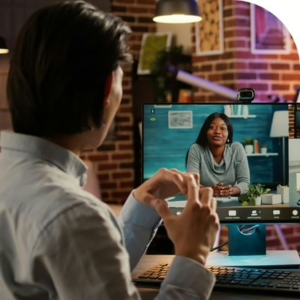Building a Remote Corporate Culture from the Ground Up
The corporate landscape underwent a seismic shift in 2020. Practically overnight, global lockdowns pushed businesses into remote operations—forcing teams, tech, and workflows to adapt at speed. Tools like Zoom, Microsoft Teams, and Google Meet became our new boardrooms. We patched bugs, reworked norms, and found new rhythms. Most importantly, we figured it out.
What was once considered unthinkable quickly became second nature. Commute hours vanished. Flexibility increased. And for many, the question became: do we ever really need to go back?

When offices reopened, organizations cautiously reintroduced in-person work. Hybrid models emerged—two days in, three days remote—but the transition was rarely smooth. In under a year, the five-day office week felt as foreign as remote work once had.
So when we founded the DAVE Group in 2023, we saw an opportunity: to build a remote-first culture with clarity and intention—rather than as a reaction to a crisis.
Together with my co-founder, Jeffery Morin (President), we launched DAVE as a fully remote company from day one. Within our first 90 days, we had team members based in Barrie, Tillsonburg, and downtown Toronto—a wide geographic spread united by shared values.
In the early days, we met weekly around my dining room table in Woodbridge. It grounded our culture. But soon, we outgrew the table—and the idea that proximity defines connection.
Two years later, we’re a team of twelve, spanning cities and time zones, aligned by trust, collaboration, and a commitment to great work. We’ve proven that culture doesn’t need a commute. It needs intention.
“Joining DAVE Group marked my first experience working remotely, and it couldn’t have gone better. They’ve created a truly connected and collaborative culture, no matter the distance. I’ve felt welcomed, supported, and motivated from day one.” — Nischal Sharma, Account Manager
There’s no shortage of talent that thrives in a remote setting. But building a high-performing, connected, and happy team requires more than just Zoom calls and Slack channels.
Here’s what we’ve learned.
1. Hire Well, Empower Fully, and Lead with Trust
The foundation of any strong culture is trust. And that starts with how you hire.
When DAVE launched, we knew we couldn’t afford to bring on junior talent—we didn’t yet have the infrastructure to support them. Instead, we made the hard but strategic decision to hire experienced people first.
We asked the right questions in interviews:
- Do they own their craft?
- Will they add to—not just fit—the culture?
- Are they aligned with where we’re headed?
These early hires became the culture bearers for the team that followed. They didn’t need micromanagement—they needed space to do great work.
“The DAVE Group has honestly blown my mind with how it has built a remote work culture that feels more like a team than any other workplace before. It truly makes me feel as though my value is through what I add to the team and what work I contribute.” — David Field, SEM Account Manager
Once your leadership talent is in place, building a path for future growth becomes much easier.
2. Build a Learning Culture from Day One
At DAVE, we promise our clients full-funnel expertise. That means our people—regardless of role—need a foundational understanding of every step in the funnel.
To support that, we mandate two hours of professional development each week. Everyone, from entry-level to executive, participates. Topics include:
- Platform Certifications (Google, Meta, Programmatic, Ad Servers)
- Data Visualization (Power BI, Looker Studio)
- AI Prompt Engineering
- Advanced Excel and Spreadsheet Analytics
- CRM and HubSpot Training
Many of these are available via Coursera or directly from platform providers. Learning isn’t an add-on—it’s a pillar.
Because better-trained employees build better-performing agencies. And when people grow, so does your business.
3. Create an Employee-First Culture (Not Just a Policy)
Employees are the engine, the output, and the reason you succeed. Treat them like it.
“What I’ve thoroughly enjoyed at The DAVE Group is the autonomy that comes with remote work, yet we remain collaborative and supportive. It’s rare to find a place where you can work independently but never feel like you’re on your own. That balance has been a game changer for me.” — Ashni Dalal, Programmatic Account Manager
Remote work doesn’t mean disconnected. But it does mean you need to be intentional about how you foster connection and culture.
Do’s and Don’ts for Building a Remote Agency
DO:
- Hold weekly all-hands meetings: Align on progress, celebrate wins, and build shared momentum.
- Use flexible workspace providers (Regus, Spaces): For client meetings or intentional team sessions.
- Plan quarterly team-building events: Escape rooms, axe throwing, shared meals—whatever reinforces culture.
- Show appreciation early: Promotions and raises should be proactive, not reactive.
“The Dave Group also plans in-person gatherings, which have become essential to building upon that sense of camaraderie as we work together, laugh together, and compete together.” — Matt Clark, Sr. SEM Account Manager
DON’T:
- Micromanage online hours: You hired professionals. Treat them that way.
- Delay tough decisions: Not everyone thrives remotely. Make space for those who do.
- Skip culture fit in interviews: Let future teammates weigh in—it smooths onboarding and strengthens retention.
- Drift from your values: High growth can cause cultural slippage. Don’t forget what made your team successful to begin with.
“This company shows me that they respect every employee's mental health and personal life, by having a balance which allows for an amazing culture where we collaborate and work together for our collective growth and success.” — David Field, SEM Account Manager
Final Thoughts
Building a remote culture isn’t about tools or trends—it’s about people.
At DAVE, we’ve built a company where culture travels across time zones, trust replaces micromanagement, and collaboration thrives without a shared address.
It takes strategy. It takes effort. But most of all, it takes belief in your people.
We’re proof that remote-first can be people-first—and performance-first too.